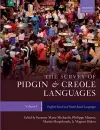
The Survey of Pidgin and Creole Languages
4 contributors - Hardback
£177.50
Susanne Maria Michaelis is is currently a creolist at the Max Planck Institute for Evolutionary Anthropology in Leipzig. Between 2008 and 2011, she held a researcher position in the APiCS project at the University of Gießen. Her early work focused on French-based Indian Ocean creoles, in particular Seychelles Creole (Temps et aspect en créole seychellois, 1993; Komplexe Syntax im Seychellen-Kreol, 1994). She is also editor of Roots of Creole Structures (Benjamins, 2008) and coeditor of the anthology Contact Languages: Critical concepts in linguistics (Routledge, 2008). Philippe Maurer is a creolist working on Ibero-Romance based creoles, mainly on Papiamentu (Les modifications temporelles et modales du verbe dans le papiamento de Curaçao, 1988) and on the Gulf of Guinea Creoles (L'angolar: un créole afro-portugais parlé à São Tomé, 1995, and Principense. Grammar, texts, and vocabulary, 2009. A book on the extinct Portuguese based Creole of Batavia and Tugu (Indonesia) will appear in 2011. Martin Haspelmath is senior scientist at the Max Planck Institut for Evolutionary Anthropology and Honorary Professor at the University of Leipzig. His research interests are primarily in the area of broadly comparative and diachronic morphosyntax (e.g. Indefinite Pronouns, OUP 1997) and in language contact (Loanwords in the World's Languages, co-edited with UriTadmor, de Gruyter 2009). He is co-editor with Matthew S. Dryer, David Gil, and Bernard Comrie, of The World Atlas of Language Structures (OUP 2005). Magnus Huber is Professor of English at the University of Giessen and an expert on English-based pidgins and creoles. He authored Ghanaian Pidgin English in its West African Context (Benjamins 1999), and edited Spreading the word. The issue of diffusion among the Atlantic Creoles (University of Westminster Press 1999) and Synchronic and diachronic perspectives on contact languages (Benjamins 2007). His research interests include world Englishes, historical sociolinguistics, dialectology, corpus linguistics, and historical linguistics.